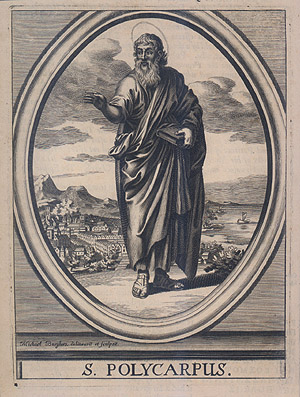Apostolic Fathers
Apostolic Fathers are a group of early Christian writers who are believed to have had a direct connection to the Apostles, or to have been significantly influenced by them. Their writings, composed in the late 1st and early 2nd centuries, are among the earliest examples of Christian literature after the New Testament. The works of the Apostolic Fathers provide valuable insights into the beliefs, practices, and organizational structure of the early Christian Church, as well as its development and challenges during its formative years.
Works and Authors[edit | edit source]
The collection of writings attributed to the Apostolic Fathers includes:
- Didache or The Teaching of the Twelve Apostles, a brief early Christian treatise which includes instructions for Christian communities on ethics, rituals, and church organization.
- First Epistle of Clement (1 Clement), attributed to Clement of Rome, is a letter addressed to the Christian community in Corinth, urging unity and harmony among its members.
- Second Epistle of Clement (2 Clement), traditionally attributed to Clement of Rome, but now considered to be a separate work by an unknown author, is an early Christian sermon.
- Epistles of Ignatius, a collection of letters written by Ignatius of Antioch to various Christian communities, emphasizing obedience to church authority, the value of unity, and the nature of the Eucharist.
- Letter of Polycarp to the Philippians, written by Polycarp, the Bishop of Smyrna, is a pastoral letter that also mentions the martyrdom of Ignatius of Antioch.
- Martyrdom of Polycarp, an account of the arrest, trial, and execution of Polycarp, serving as an early example of Christian martyr literature.
- Shepherd of Hermas, a Christian literary work of the 2nd century, consisting of visions, mandates, and parables. It was very popular in early Christianity and was even considered scriptural by some of the Church Fathers.
- Epistle of Barnabas, a treatise that covers various theological issues, including the interpretation of the Old Testament and the distinction between the Old and New Covenants.
- Fragments of Papias, consisting of excerpts from the work of Papias of Hierapolis, which includes interpretations of the sayings of Jesus as well as descriptions of the early Christian community.
Significance[edit | edit source]
The writings of the Apostolic Fathers are crucial for understanding the development of Christian theology, ecclesiology, and sacramental life in the period immediately following the New Testament era. They provide a window into the transition from the apostolic age to the establishment of a structured church hierarchy. These documents also reflect the challenges faced by early Christians, such as persecution, internal division, and the formulation of orthodox doctrine in response to heretical teachings.
Theological Themes[edit | edit source]
The Apostolic Fathers dealt with a variety of theological themes that were pertinent to the early church, including:
- The nature of Christ's divinity and humanity
- The importance of apostolic tradition and teachings
- The role of bishops, presbyters, and deacons in church governance
- The significance of the Eucharist and baptism
- Eschatological expectations and the belief in the imminent return of Christ
Legacy[edit | edit source]
The Apostolic Fathers' works have had a lasting impact on Christian theology and practice. Their emphasis on community life, ecclesiastical authority, and adherence to the teachings of the apostles laid the groundwork for the development of later Christian doctrine and church structure. Their writings continue to be studied for their historical value, as well as their contributions to theological discussions and ecclesiastical polity.
This article is a Christianity-related stub. You can help WikiMD by expanding it!
Search WikiMD
Ad.Tired of being Overweight? Try W8MD's physician weight loss program.
Semaglutide (Ozempic / Wegovy and Tirzepatide (Mounjaro / Zepbound) available.
Advertise on WikiMD
|
WikiMD's Wellness Encyclopedia |
| Let Food Be Thy Medicine Medicine Thy Food - Hippocrates |
Translate this page: - East Asian
中文,
日本,
한국어,
South Asian
हिन्दी,
தமிழ்,
తెలుగు,
Urdu,
ಕನ್ನಡ,
Southeast Asian
Indonesian,
Vietnamese,
Thai,
မြန်မာဘာသာ,
বাংলা
European
español,
Deutsch,
français,
Greek,
português do Brasil,
polski,
română,
русский,
Nederlands,
norsk,
svenska,
suomi,
Italian
Middle Eastern & African
عربى,
Turkish,
Persian,
Hebrew,
Afrikaans,
isiZulu,
Kiswahili,
Other
Bulgarian,
Hungarian,
Czech,
Swedish,
മലയാളം,
मराठी,
ਪੰਜਾਬੀ,
ગુજરાતી,
Portuguese,
Ukrainian
Medical Disclaimer: WikiMD is not a substitute for professional medical advice. The information on WikiMD is provided as an information resource only, may be incorrect, outdated or misleading, and is not to be used or relied on for any diagnostic or treatment purposes. Please consult your health care provider before making any healthcare decisions or for guidance about a specific medical condition. WikiMD expressly disclaims responsibility, and shall have no liability, for any damages, loss, injury, or liability whatsoever suffered as a result of your reliance on the information contained in this site. By visiting this site you agree to the foregoing terms and conditions, which may from time to time be changed or supplemented by WikiMD. If you do not agree to the foregoing terms and conditions, you should not enter or use this site. See full disclaimer.
Credits:Most images are courtesy of Wikimedia commons, and templates, categories Wikipedia, licensed under CC BY SA or similar.
Contributors: Prab R. Tumpati, MD

